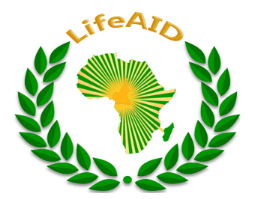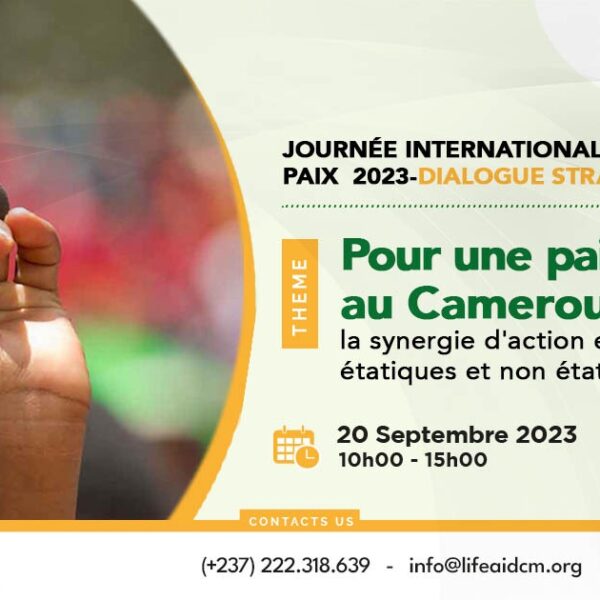
- This event has passed.
For a Sustainable Peace in Cameroon: Strengthening Synergy of Actions between State and non-State Actors
1. INTRODUCTION
LifeAID in partnership with the Ministry of External Relations is organizing a Strategic Dialogue to foster sustainable peace and security in commemoration of the 2023 International peace day in Cameroon. This strategic dialogue forms part of the activities of the second phase of the Youth Initiative for Inclusive Dialogue (YIID) Program that aims at reducing existing intergenerational gaps, foster the culture of dialogue, trust and mutual engagement between youths, communities and various stakeholders in the quest for lasting solutions to society’s pressing challenges. As a continuation of the Grand National Dialogue organized by the government of Cameroon in 2019, the YIID Program also seeks to capture the voices and contributions of the youth constituency, community leaders, experts and stakeholders especially those who didn’t have the opportunity to participate in the grand national dialogue, as an inclusive governance approach to fostering the peace, security and development needed in Cameroon.
LifeAID is a Cameroon based Non-profit that fosters youth centered development initiatives, peace, security, community development and policy research in Cameroon and Africa.
2. BACKGROUND AND RATIONALE
Each year the international peace day is celebrated around the world on 21 September which was declared by the UN General Assembly as a day devoted to strengthen the ideals of peace, through observing 24 hours of non-violence and cease-fire. However, in Africa today, the aspiration to achieve sustainable peace, prosperity and economic growth is often threatened by different factors such as governance deficiencies, inequality, poverty, unemployment, insecurity and climate driven disasters in spite of the abundance of enormous natural resources to create wealth and employment opportunities for citizens.
This year’s commemoration of the International Day of Peace is taking place against a backdrop of insecurities and conflicts in Africa and around the boarders of Cameroon on the one hand, and internal crises that are challenging Cameroon’s long-standing reputation as a haven of peace in sub-Saharan Africa and the rest of the world. Since 2013, the collateral effects of instability in the Central African Republic have left the eastern part of the country vulnerable to insecurity.
While there are several and increasing influx and camping of refugees from Central African Republic and Sudan, the actions of rebel groups continue to threaten peace by disrupting the social fabric, with a strong impact on young people in the Country. In the north, attacks by the Islamist group Boko Haram since 2014 have turned the Far North Region into a habitat of insecurity. The jihadist group is multiplying terrorist attacks and acts of violent extremism with devastating effects on the lives and well-being of the population. In the North West and South West regions, the protests of teachers and lawyers gradually led to open armed conflict between the forces of defense and security and seperative groups. The human, economic and social tolls of these conflicts are quite telling. Within this context, the circulation of Small arms and light weapons has become a real challenge for public authorities.
In addition to these crises, there is the prevalence of inter-community conflicts exacerbated by the scarcity of resources due to the consequences of climate change. The recent clashes in the Far North region between Choa Arab herders and Mosgoum fishermen; the farmers and graziers in Bui, Wum, Ngoketunjia and Mezam divisions of the North West region over control of green spaces that are gradually being decimated by global warming to name a few, show just how much ecological issues can be a source of conflict that undermines peace. What’s more, the specter of inter-community conflagration is now being fuelled by the resurgence of hate speech, the expression of identity-based withdrawal in the form of tribalism and the proliferation of fake news. In this respect, Cameroon through the Ministry of External Relations has been mandated by the United Nations Standing Advisory Committee on Security Questions in Central Africa (UNSAC) to ensure follow-up of actions that will lead to the political endorsement
of the draft sub-regional strategy and action plan to address and counter hate speech in Central Africa that was adopted in June 2022, in Kinshasa (Democratic Republic of Congo). This obviously forms part of a decisive role in the fight against hate speech and the proliferation of fake news, which are real contemporary destabilizing factors and threats to peace in Cameroon and Central Africa.
The radicalization, involvement of youths in various hostilities and the consequences of various conflicts and crises on women and youths as major victims can no longer be underestimated. From the classic narrative consideration of youth as perpetrators of violence and treat to peace and security to the new narrative adopted by the United Nations Security Council Resolutions 2250 (2015), 2419(2018), 2535(2020) and the African Union adopted Continental Framework for Youth, Peace and Security in Africa, youths are influential actors and important partners for effective and sustainable peace and security. Unfortunately, young men and women are also victimized by the negative aspects of western civilizations, poverty, unemployment and underemployment which in part has contributed to declining moral and civic values as well as drive their recruitment into hostilities. These necessitate not only their active involvement in various decision-making and peace processes but also, effective moral, civic, patriotic and
entrepreneurial rearmament. Meanwhile, any meaningful attempts to foster sustainable peacebuilding, prosperity and growth in Africa and Cameroon in particular must include building a strong private sector and civil society, spurred by entrepreneurs and civil society activists, advancing peace, stability and development. As it follows, there’s no doubt that the role of Women, the youth and the private sector in general are crucial to the peace we need in Cameroon.
Several government initiatives have been undertaken to respond effectively to various crises and restore peace in Cameroon. The organization of the Grand National Dialogue (GND) in 2019, for example, has made it possible to chart a way out of the conflict in the English-speaking zone by recognizing the special status of the North-West and South-West Regions. Other government measures include the adoption of the General Code of Decentralized Local Authorities, the creation of the National Commission for the Promotion of Bilingualism and Multiculturalism, the
implementation of the Disarmament, Demobilization and Reintegration (DDR) programme, and the implementation of the Presidential Plan for the Reconstruction of the Far North, North West and South West Regions. Non-state actors such as technical and financial partners, civil society organizations, the clergy and the media are also involved in restoring peace through awareness raising, support and advocacy. Due to the weakened economic environment in these two regions, the Prime Minister and Head of Government in 2019 granted the status of economic disaster
areas to the Far-North, North-West and South-West Regions. Attempting to localize the UN Security Council resolution 1325 (2000) on Women, Peace and Security, Cameroon adopted its first National Action Plan (NAP) to guide the participation and protection of the woman in 2017 for the period 2018-2020. The National Development Strategy (NDS30) was also developed to capture the needs of the Cameroonian society and engage Cameroonians towards stronger unity, peace and security; stronger democracy; prosperity; and universal access to quality social
services.
Despite these actions, it appears that a full return to normalcy and sustainable peace remains a real challenge in Cameroon and the risk of not only the escalation of old conflicts but the eruption of new social, environmental and politically motivated instability is high. This now requires a synergy of actions between state and non-state actors in order, on the one hand, to carry out an evaluation of existing strategies to prevent, end various crises and foster stability and growth as supported by the National Development Strategy (NDS30) and, on the other hand, to achieve the United Nations’ Sustainable Development Goals (SDGs) by 2030. It is for this reason that LifeAID whose traditional goal is to catalyze peace, security and development processes, is partnering with the Ministry of External Relations to organize a strategic dialogue in commemoration of the international peace day, to foster a state-non-state actor’s engagement to building an effective melting pot for sustainable peace and security in Cameroon, anchored in the awareness, involvement and mobilization of all citizens, the private sector, the civil society, the youth and women as well as a proper inclusive early warnings and early response mechanism.
3. PROJECT DESCRIPTION
3.1 Theory of change
- Stimulate strategic dialogue between relevant stakeholders to take actions towards accelerating the consolidation of sustainable peace in Cameroon in order to achieve the United Nations 2030 Sustainable Development Goals and Cameroon’s National Development Strategy (NDS 30).
3.2 Goal
- Providing the opportunity for various actors to brainstorm and to take actions towards addressing emerging and existing conflicts and insecurities within Cameroon.
3.3 Specific objectives
- Engage stakeholders to brainstorm and discuss on operational measures to prevent new insecurities while build and consolidate sustainable peace in Cameroon;
- Create awareness and sensitize actors on existing frameworks and measures to prevent conflict and build peace;
- Share experiences and best practices on various actions by both specialized state institutions and non-state actors in preventing conflicts and building sustainable peace in Cameroon;
- Network state and non-state actors to building trust while engage to joint efforts in the fighting insecurity and sustaining peace within the Cameroonian space.
4. TARGET
This discussion is open to national and international institutions, diplomatic representations, public decision- makers, youth, civil society organizations, think tanks, academics and the general public without restriction.
Number of participants: 100
5. EXPECTED OUTCOME
Outcome 01:
- Relevant government ministries and non-state stakeholders are involved in jointly developing a policy paradigm shift regarding conflict prevention and management in Cameroon.
Outcome 02:
- Youths, women, civil society and private sector actors are granted participation niches to effectively address conflict prevention and management issues in Cameroon.
Outcome 03:
- Cameroon is more prepared to face rising insecurity while manage existing conflicts and build sustainable peace.
6. OUTPUTS
- The voices of state and non-state actors are captured into a final strategy outcome document or reports;
- The technical capacities of key government institutions and non-state actors are enhanced to strengthen peace and security process;
- Better awareness, strategy and state-non state engagement are taken to prevent conflict and build exportable and sustainable peace in Cameroon.
7. METHODOLOGICAL APPROACH
The strategic dialogue will feature introductory presentations by a few hand-picked specialists around a moderator. After the presentations, an open lively discussion with all the participants is going to take place.
MINREX will help to mobilize participants by sending letters of invitation to panelists and other stakeholders.
The technical secretariat, responsible for taking notes and drafting reports, will be jointly handled or made up of both MINREX and LifeAID staff.
The Protocol will be provided by MINREX teams.
8. THEME FOR DISCUSSION
Inaugurale Lesson: Peace and Security, Our treasured Good to be preserved in Cameroon
Panel 1: Stakes and imperatives of safeguarding peace and security by the State in Cameroon
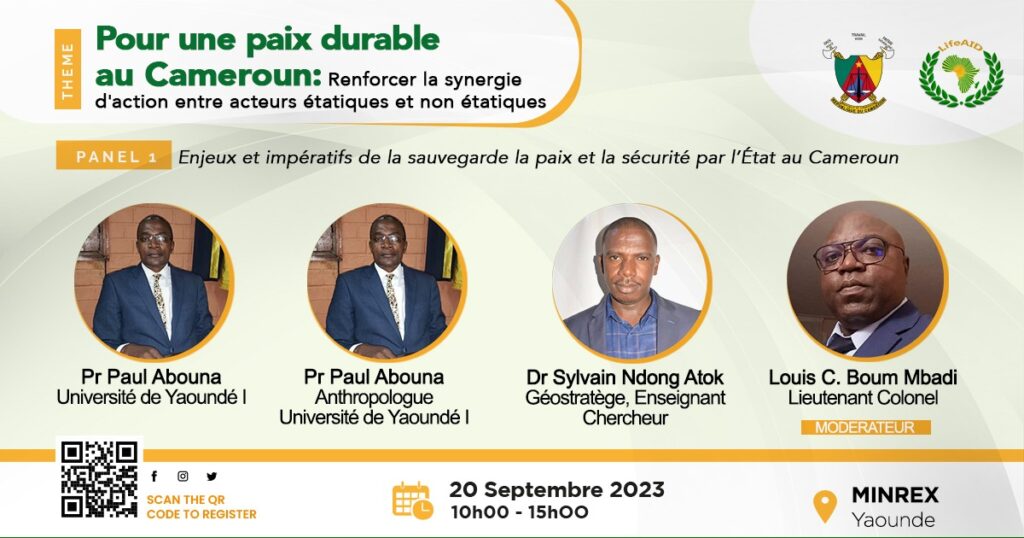
1. Reflecting on the trends and stakes of growing global and regional insecurity and their consequences on peace and security in Cameroon
2. State engagement in safeguarding external and internal security amidst the flow of small arms and light weapons
3. Overcoming ethnic division, separatism and violent extremism in order to build peace and security in Cameroon
Panel 2: Fostering Sustainable Peace: What Suitable Strategy against Hate Speech, Fake
News?
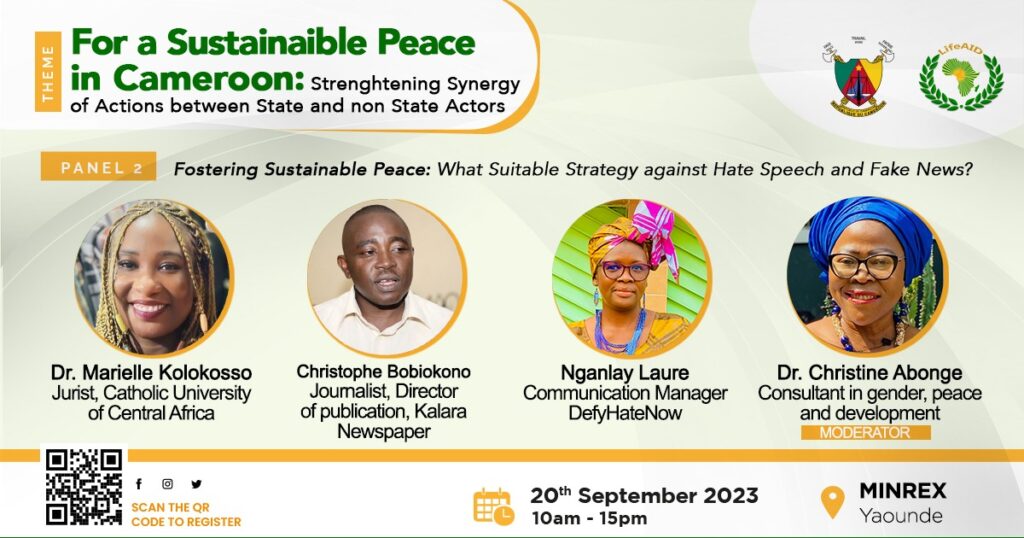
1. Countering Hate Speech and Fake news in Cameroon: instruments, efforts, challenges and prospects
2. What Contribution from the civil society, journalists and the media in the Fight against Hate Speech and Fake news?
3. What Strategies for Promoting Peace in the Digital Space in Cameroon?
Panel 3: Acting hand in hand to prevent conflicts and insecurity: building a national stakeholding culture of Peace in Cameroon
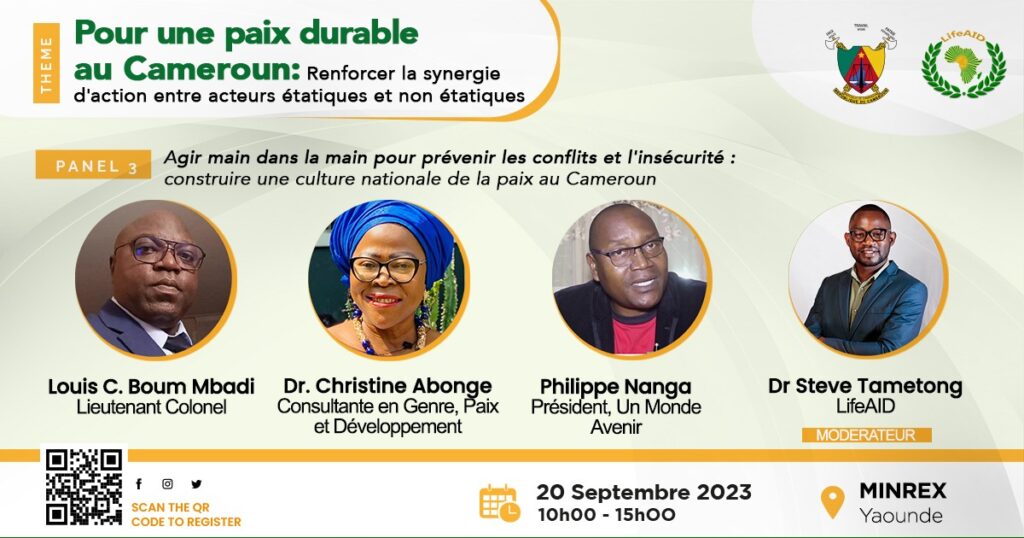
1. Consolidating the army-nation link in the prevention and restoration of security and peace in Cameroon
2. Local processes in engaging Women and Youth contributions to conflict prevention and peace-building in Cameroon
3. Beyond the Upcoming Elections: Preserving Peace and stability an Imperative for Political Stakeholders and Cameroonians.
